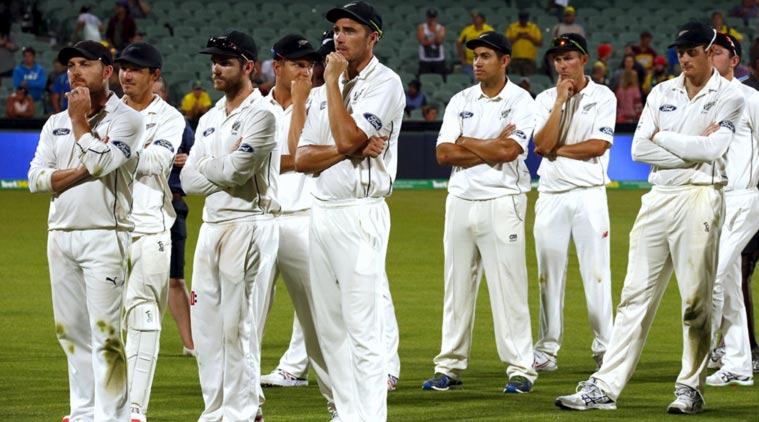New Zealand await ICC clarification on DRS controversy
 New Zealand lost the match, series against Australia in Adelaide on Sunday. (Source: Reuters)
New Zealand lost the match, series against Australia in Adelaide on Sunday. (Source: Reuters)
New Zealand are awaiting clarification from the International Cricket Council regarding Nigel Llong’s contentious third umpire decision in the day-night Test against Australia after the ruling had an “impact” on the game, coach Mike Hesson has said.
Llong’s reprieve of Australia’s Nathan Lyon on day two was widely criticised and sparked debate over the proper use of the decision review system.
After Lyon survived the review for caught behind, Australia piled on 108 runs for their final two wickets to reel in New Zealand’s lead and ultimately won the match by three wickets late on day three.
“It was excellent, wasn’t it?” Hesson remarked with sarcasm when asked about Llong’s review. “I think everybody at the ground saw what unfolded. It’s been spoken about a lot.
“We’ve certainly made our representation to the ICC and at present we’re still waiting an acceptable response.
“There has been an official representation from New Zealand Cricket and from the team management as well. We’re going through the proper channels and we’re awaiting their response.
“I guess we’ll never know (the whole impact). The game carried on and took a number of other twist and turns after that … but it certainly had an impact.”
New Zealand were convinced Lyon was out when his attempted sweep shot sent the ball looping into the slips and the spinner himself started walking back to the Adelaide Oval dressing room when the ‘Hot Spot’ technology revealed a mark on his bat.
Bizarrely, during five minutes of deliberations that sparked jeers from a restless crowd, Llong dismissed the evidence out of hand, saying the mark on his bat “could have come from anywhere”.
Adding to the farce, Llong also looked for a possible lbw during his review, but ended up assessing the wrong delivery.
The decision review system regularly generates controversy but Hesson was clear on where he felt the blame should fall.
“I think that the technology’s got a bit of a bad rap,” he said. “I don’t think there’s anything wrong with the technology at all.”





